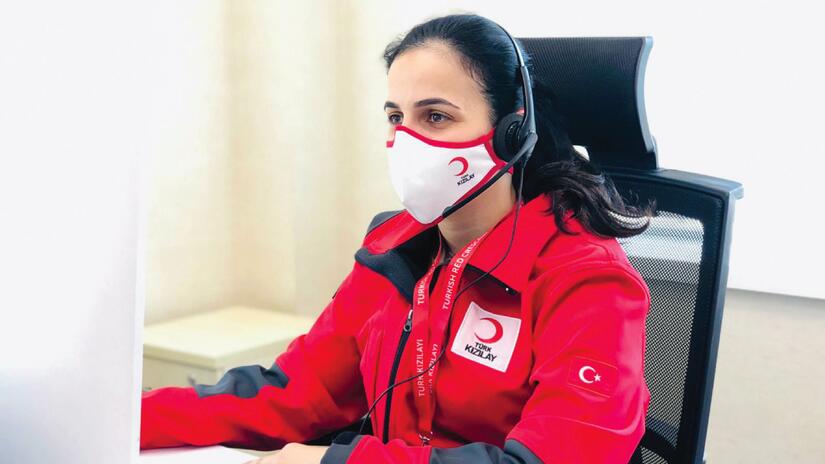Seren Sabancı Keser, a 27-year-old call centre operator at Turkish Red Crescent, received a call from a refugee in need who could not go and receive his Kızılaykart (a prepaid debit card)– he was in hospital after showing COVID-19 symptoms. This debit card provides them with cash assistance to help meet their basic needs.
This is just one of the many calls Seren has received over the past few months. Calls significantly increased after the COVID-19 pandemic was first confirmed in Turkey.
“The numbers of call we received during the pandemic peaked in the past 3 months. Refugees have been affected socially, physically, financially, in every imaginable way, like the rest of the world. You understand the desperation of those who lost their jobs from their voice,” said Seren.
Adapting to the COVID-19 response
The Turkish Red Crescent call centre Seren works at has operators, speaking five different languages. She wears a headset microphone over her disposable face mask, offering support and information to the most vulnerable refugees in Turkey, the largest refugee-hosting country worldwide, amid strict measures taken against COVID-19. Seren responds to many calls from refugees receiving the EU-funded Emergency Social Safety Net (ESSN) cash assistance programme, jointly run by IFRC and Turkish Red Crescent. Shortly after the first COVID-19 case was reported in Turkey in mid-March, strict measures were introduced by the Turkish government in a bid to curb the spread of the pandemic in the country. Lockdown was introduced for those above 65 years and under 20 years old and inter-city travel restrictions and weekend curfews were imposed.
Unlike many workplaces which had to stop their operations, the call centre quickly adapted by taking the necessary precautions. The workplace was immediately arranged to provide enough space between the desks according to social distance precautions, necessary protective equipment was provided, and alternative transportation choices were offered to the staff members.
Seren underlined that the call centre played a key role in the lives of refugees when the pandemic first erupted in Turkey.“ As they can’t go out and everywhere is closed,” said Seren, adding that they never stopped receiving the calls.
Growing humanitarian needs in the wake of COVID-19
Most of the calls Seren has received from refugees relate to loss of jobs and difficulties in meeting their essential needs such as food, hygiene items, rent and bills.
“Most of the times people calling are saying they lost their jobs and if there will be additional help – if there are any food or hygiene packages that will be provided,” she said.
A rapid assessment conducted by IFRC and Turkish Red Crescent with those who receive support through the ESSN programme, found that COVID-19 has deeply impacted vulnerable refugees. Almost 70 per cent of refugees surveyed lost their jobs and 78 per cent faced an increase in their expenses, according to the report.
Providing two-way communication with refugee families despite COVID-19
Launched in November 2016, as a mechanism to enable two-way communication between humanitarian responders and affected communities, the call centre receives calls from refugees who benefit and want to benefit from ESSN. Apart from being the first responder to answer refugees’ questions and find solutions to refugees’ challenges, Seren and her colleagues also refer refugees to other types of assistance provided by Government Social Assistances Service and Turkish Red Crescent other units serving specific to refugees to ensure they get the support they need. Call centres also became a critical source of information on preventing and responding to COVID-19 cases. As part of steps to inform refugees about COVID-19, the call centre also replaced the call waiting tone with informative messages in five different languages, explaining hygiene rules and other kinds of preventive measures against the pandemic.
“We encourage them to use masks all the time and refer to a medical institution or call the Ministry of Health hotline if they were in touch with a COVID-19 patient,” she said.
This is not the first time Seren has worked with refugees. Thanks to her Arabic language skills and due to her calling to help others, she has been supporting refugees since the start of the Syrian refugee exodus.
Seren says her work can be tiring as her thoughts don’t stop when she goes home in the evening. The possibility of helping more people is always in the back of her mind.
“When we are having a busy day, the only thing in my mind is how I can receive more calls, help more people immediately,” Seren said. “Because there are many refugees in need of support.”
This article covers humanitarian aid activities implemented with the financial assistance of the European Union. The views expressed herein should not be taken, in any way, to reflect the official opinion of the European Union, and the European Commission is not responsible for any use that may be made of the information it contains.
Article
Rural Guatemalan women at the heart of community health
Rural Guatemalan women at the heart of community health
| Article

